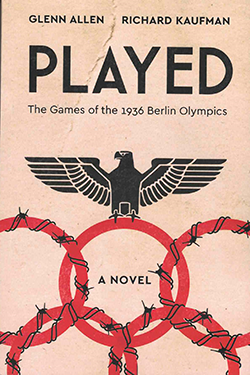Played: The Games of the 1936 Berlin Olympics by Glenn Allen and Richard Kaufman; Denver, Colorado: Wordserve Publishing © 2024; ISBN 9781733-170758; 426 pages plus notes, $18.95.

 SAN DIEGO – This novel about the Nazi Olympics was meticulously researched and then fictionalized so that we could eavesdrop on conversations sometimes together, sometimes apart, of the two most treacherous villains of the piece: Adolf Hitler and Avery Brundage.
SAN DIEGO – This novel about the Nazi Olympics was meticulously researched and then fictionalized so that we could eavesdrop on conversations sometimes together, sometimes apart, of the two most treacherous villains of the piece: Adolf Hitler and Avery Brundage.
Hitler sought a propaganda victory for his Nazified country with the Olympic Games supposed to be the setting for a demonstration of “Aryan” superiority. Brundage, blinded by his own lust for prominence, became Hitler’s stooge, so desperate was he to rise to the presidency of the International Olympic Committee.
Outrage after outrage occurred before and during the Olympic Games, including but not limited to:
–Brundage complying with Hitler’s demand for the removal of two Jewish sprinters—Marty Glickman and Sam Stoller—from the American relay team.
–The Nazis breaking a promise that Gretel Bergmann, a previous record-holder in the high jump, would be allowed to compete on the German team. She was removed from the games because she, too, was Jewish.
–The reversal of Peru’s victory over the Austrian soccer team by judges who were ordered by Nazis to disqualify several Peruvian goals. The Peruvians left the games in protest, followed by some other South American delegations.
–The removal from the American team of swimmer/ actress Eleanor Holm for refusing Brundage’s sexual advances.
Despite the Nazis trying to put their thumbs on every scale, the American athletes acquitted themselves quite well, most especially the African-American track star Jesse Owens who won a record-breaking four gold medals, putting the lie to Hitler’s claim of Aryan superiority. Three Americans swept the diving competition: 13-year-old Marjorie Gestring, who was everyone’s favorite, Katherine Rawls and Dorothy Poynton-Hill. To everyone’s surprise, American rowers bested the favored German team on the last day of competition.
The authors posited a steamy love affair between Glenn Morris, an American decathlete, and Leni Riefenstahl, the German filmmaker who was expressly hired on Hitler’s orders to make a propaganda film about the games. In this version, Riefenstahl was devoted to filming all the great moment of the Olympics, no matter that her employers expected her to glorify the Germans.
Intrigue, high-stakes politics, sex, and violence will have readers wanting to continue turning more than the 426 pages in this finely-paced novel. Sports fans will thrill to the tale, but even those who are indifferent to spectators sports may find themselves caught up in the international drama that surrounded those Olympic Games.
*
Donald H Harrison is publisher and editor of San Diego Jewish World.